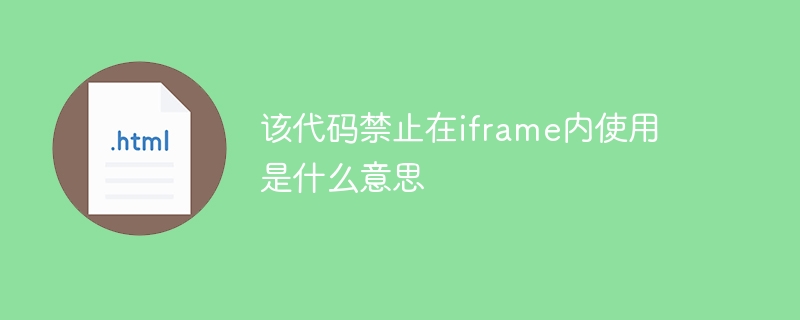
This code prohibits use within iframes, which means that in web development, specific code or settings are used to prevent web pages from being displayed or loaded in iframes. In some cases, the content of web pages may contain sensitive information or functions, such as login forms, payment pages, etc. By prohibiting use in iframes, the security of web pages can be increased to ensure that user information will not be abused. It can prevent other websites from displaying their own content by embedding iframes and protect their copyright. You can ensure that web pages are displayed in a normal browser window and so on.

# Operating system for this tutorial: Windows 10 system, Dell G3 computer.
This code is prohibited from being used within iframes. This means that in web development, specific code or settings are used to prevent web pages from being displayed or loaded in iframes (embedded frames). This restriction is usually for security reasons to prevent malicious websites or attackers from stealing user information or performing other inappropriate behaviors through iframes.
In modern web development, iframe is a commonly used HTML element that allows one web page to be embedded in another web page. By using iframes, developers can embed other web pages or content into their own web pages to achieve some specific functions or displays.
However, sometimes developers may want to restrict the use of their web pages in iframes, which may be for several reasons:
Security: In some cases, web pages The content may contain sensitive information or functionality, such as login forms, payment pages, etc. If these contents are embedded into iframes on other websites, information may be leaked or used maliciously. By prohibiting use in iframes, the security of web pages can be increased to ensure that user information will not be abused.
Copyright Protection: Some websites may want to protect their content from being stolen or copied by other websites. By prohibiting use in iframes, you can prevent other websites from displaying their content by embedding iframes, thus protecting their copyright.
User experience: Sometimes displaying web pages in iframes may cause user experience problems. For example, the web page may not fit correctly within the size of the iframe, causing content to be truncated or displayed incompletely. By disabling use in iframes, you can ensure that web pages are displayed in normal browser windows, providing a better user experience.
To disable the use of web pages within iframes, developers can do so by adding specific tags or settings to the code of the web page. Common methods include using the X-Frame-Options header, Content-Security-Policy header, or JavaScript code to restrict the use of iframes.
In short, prohibiting the use of web pages in iframes is a common security measure designed to protect the security of web page content and user information. Developers can decide whether to prohibit the use of web pages in iframes based on their own needs and circumstances, and take appropriate measures to implement restrictions.
The above is the detailed content of What does it mean that this code is prohibited from being used within an iframe?. For more information, please follow other related articles on the PHP Chinese website!
 What are the ways to write iframe?
What are the ways to write iframe? The role of applet tag in html
The role of applet tag in html How to solve deletefile error code 5
How to solve deletefile error code 5 Virtual number receives verification code
Virtual number receives verification code What are the access modifiers for classes in php
What are the access modifiers for classes in php Is c language the same as c++?
Is c language the same as c++? How to configure JDK environment variables
How to configure JDK environment variables How to delete your own works on TikTok
How to delete your own works on TikTok



